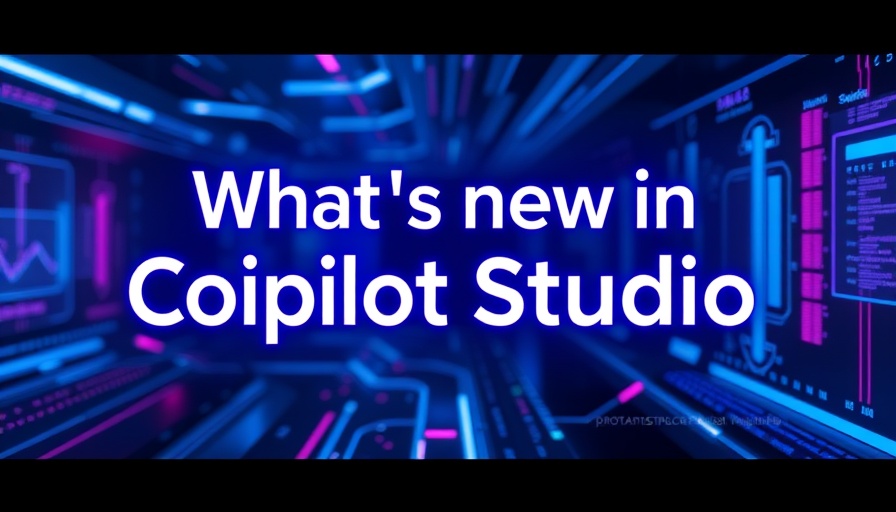
Unveiling New Innovations in Microsoft Copilot Studio
As we step into the future of AI, Microsoft continues to refine and enhance its offerings in Copilot Studio. This latest update, which includes features rolled out in September 2025, showcases the company’s commitment to creating smarter, more efficient digital assistants for enterprises. From task automation to enhanced communication channels, these innovations are set to reshape how businesses interact with technology.
Enhanced Automation with Computer Use in Public Preview
The standout feature of this update is the introduction of the Computer Use functionality, now available in public preview for U.S.-based environments. With the ability to automate user interface tasks, agents can now perform actions like clicking and typing like a real user, fostering greater adaptability in workflows that previously lacked direct API connections. This enhancement spans various use cases, including data entry and reporting, and represents a significant step toward more intuitive automation tools.
WhatsApp Integration: Engaging Customers Where They Are
Microsoft Copilot Studio also introduces integration with WhatsApp, a platform boasting over 2.7 billion users globally. This feature allows businesses to deploy AI agents within a familiar communication channel, enhancing customer interactions and support services. Businesses can leverage the power of AI for activities such as order tracking and appointment scheduling, fostering deeper connections with customers. This strategic move signifies Microsoft's understanding of evolving communication preferences among consumers.
Streamlined Prompt Testing for AI Accuracy
Another noteworthy enhancement is the upgraded prompt builder which now allows for systematic testing and enrichment of prompts. Makers can create comprehensive test sets and tailor evaluations to their specific use cases, addressing attributes such as tone and clarity. This feature aims to enhance the overall performance of AI agents, giving businesses the confidence that their inputs will yield reliable results. By reducing rework and shortening testing cycles, Microsoft is making it easier for developers to refine their tools continually.
Knowledge Architecture: Organizing Information Efficiently
With the addition of file grouping capabilities, agents can now utilize organized knowledge sources more effectively. This functionality enables makers to group locally uploaded files—up to 12,000 at once—allowing for more precise querying and responses. This change is crucial for businesses handling extensive databases, as it reduces clutter and increases accuracy, ensuring that users receive the most relevant information promptly.
Reusable Components: Simplifying Development
The general availability of component collections centralizes the management of Copilot tasks. This allows developers to package various components of an agent, such as topics and actions, into reusable collections, streamlining application lifecycle management. As a result, teams can maintain consistency across agents and reduce development time, making it easier to innovate faster.
Analytics Tools: Measuring Success and Impact
Measuring the efficacy of AI agents has become simpler with the latest analytics features. Insights into agent performance reveal user engagement patterns, allowing for tailored adjustments that enhance effectiveness. Novel metrics include tracking unique active users and evaluating savings from agent runs, thus providing a comprehensive framework for assessing ROI.
Learning and Development: Copilot Studio Agent Academy
Recognizing the need for continuous learning, Microsoft has launched the Copilot Studio Agent Academy, a comprehensive program designed to help developers build effective agents. This free curriculum offers progressive learning paths from foundational training to advanced deployment practices, ensuring a robust understanding of the tools at hand. By fostering skills within the community, Microsoft aims to enhance the capabilities of AI development.
Conclusion: Embracing the Future of AI with Microsoft Copilot Studio
The September 2025 updates to Microsoft Copilot Studio mark a pivotal moment in the evolution of AI tools for business applications. By enhancing automation, integrating popular communication platforms, streamlining prompt testing, and empowering developers through education, Microsoft is set on a trajectory to not only meet but exceed user expectations. As AI continues to intersect with everyday business practices, organizations are encouraged to explore these features and harness their potential to improve operational efficiency and customer relationships.
To explore the full range of capabilities offered by Microsoft Copilot Studio, visit their website for more information, or try it for free today.
 Add Row
Add Row  Add
Add 




Write A Comment